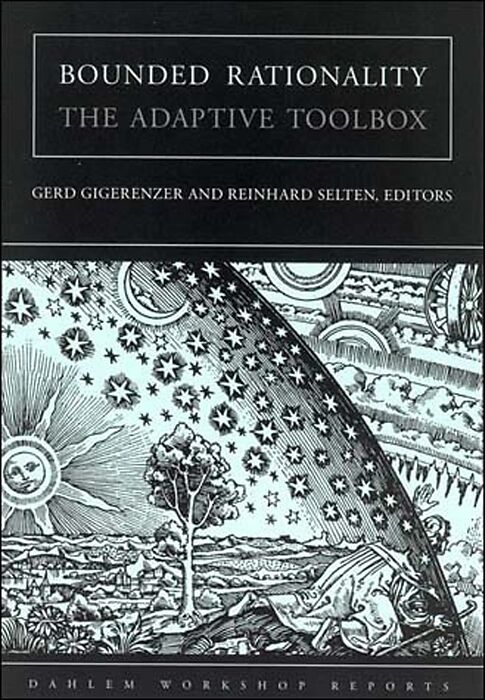Bounded Rationality
Einband:
Kartonierter Einband
EAN:
9780262571647
Untertitel:
The Adaptive Toolbox
Autor:
Gerd; Selten, Reinhard Gegerenzer
Herausgeber:
MIT Press
Anzahl Seiten:
394
Erscheinungsdatum:
26.07.2002
ISBN:
0262571641
Zusatztext Bounded Rationality constitutes a milestone in the development of a framework for understanding human cognition. Robert Kurzban , Contemporary Psychology Informationen zum Autor Gerd Gigerenzer is Director at the Max Planck Institute for Human Development, Berlin. He is the author of Calculated Risks , among other books, and the coeditor of Bounded Rationality: The Adaptive Toolbox and Heuristics and the Law , both published by the MIT Press. The late Reinhard Selten was Professor at the University of Bonn and was a co-winner of the 1994 Nobel Prize in Economics. Klappentext In a complex and uncertain world, humans and animals make decisions under the constraints of limited knowledge, resources, and time. Yet models of rational decision making in economics, cognitive science, biology, and other fields largely ignore these real constraints and instead assume agents with perfect information and unlimited time. About forty years ago, Herbert Simon challenged this view with his notion of "bounded rationality." Today, bounded rationality has become a fashionable term used for disparate views of reasoning. This book promotes bounded rationality as the key to understanding how real people make decisions. Using the concept of an "adaptive toolbox," a repertoire of fast and frugal rules for decision making under uncertainty, it attempts to impose more order and coherence on the idea of bounded rationality. The contributors view bounded rationality neither as optimization under constraints nor as the study of people's reasoning fallacies. The strategies in the adaptive toolbox dispense with optimization and, for the most part, with calculations of probabilities and utilities. The book extends the concept of bounded rationality from cognitive tools to emotions; it analyzes social norms, imitation, and other cultural tools as rational strategies; and it shows how smart heuristics can exploit the structure of environments. Zusammenfassung In a complex and uncertain world, humans and animals make decisions under the constraints of limited knowledge, resources, and time. Yet models of rational decision making in economics, cognitive science, biology, and other fields largely ignore these real constraints and instead assume agents with perfect information and unlimited time. About forty years ago, Herbert Simon challenged this view with his notion of "bounded rationality." Today, bounded rationality has become a fashionable term used for disparate views of reasoning. This book promotes bounded rationality as the key to understanding how real people make decisions. Using the concept of an "adaptive toolbox," a repertoire of fast and frugal rules for decision making under uncertainty, it attempts to impose more order and coherence on the idea of bounded rationality. The contributors view bounded rationality neither as optimization under constraints nor as the study of people's reasoning fallacies. The strategies in the adaptive toolbox dispense with optimization and, for the most part, with calculations of probabilities and utilities. The book extends the concept of bounded rationality from cognitive tools to emotions; it analyzes social norms, imitation, and other cultural tools as rational strategies; and it shows how smart heuristics can exploit the structure of environments. ...
Autorentext
Gerd Gigerenzer is Director at the Max Planck Institute for Human Development, Berlin. He is the author of Calculated Risks, among other books, and the coeditor of Bounded Rationality: The Adaptive Toolbox and Heuristics and the Law, both published by the MIT Press.
The late Reinhard Selten was Professor at the University of Bonn and was a co-winner of the 1994 Nobel Prize in Economics.
Klappentext
In a complex and uncertain world, humans and animals make decisions under the constraints of limited knowledge, resources, and time. Yet models of rational decision making in economics, cognitive science, biology, and other fields largely ignore these real constraints and instead assume agents with perfect information and unlimited time. About forty years ago, Herbert Simon challenged this view with his notion of "bounded rationality." Today, bounded rationality has become a fashionable term used for disparate views of reasoning.This book promotes bounded rationality as the key to understanding how real people make decisions. Using the concept of an "adaptive toolbox," a repertoire of fast and frugal rules for decision making under uncertainty, it attempts to impose more order and coherence on the idea of bounded rationality. The contributors view bounded rationality neither as optimization under constraints nor as the study of people's reasoning fallacies. The strategies in the adaptive toolbox dispense with optimization and, for the most part, with calculations of probabilities and utilities. The book extends the concept of bounded rationality from cognitive tools to emotions; it analyzes social norms, imitation, and other cultural tools as rational strategies; and it shows how smart heuristics can exploit the structure of environments.
Zusammenfassung
This book promotes bounded rationality as the key to understanding how real people make decisions.

Leider konnten wir für diesen Artikel keine Preise ermitteln ...
billigbuch.ch sucht jetzt für Sie die besten Angebote ...
Die aktuellen Verkaufspreise von 6 Onlineshops werden in Realtime abgefragt.
Sie können das gewünschte Produkt anschliessend direkt beim Anbieter Ihrer Wahl bestellen.
Loading...
Die aktuellen Verkaufspreise von 6 Onlineshops werden in Realtime abgefragt.
Sie können das gewünschte Produkt anschliessend direkt beim Anbieter Ihrer Wahl bestellen.
| # | Onlineshop | Preis CHF | Versand CHF | Total CHF | ||
|---|---|---|---|---|---|---|
| 1 | Seller | 0.00 | 0.00 | 0.00 |
